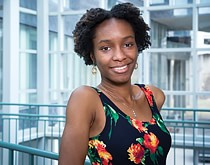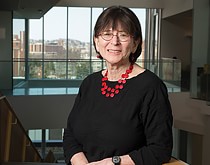Mopewa Ogundipe watches in anticipation as her robot sets out for its run. The Carnegie Mellon junior has spent the entire semester of a robotics course programming a retrofitted Neato robotic vacuum cleaner to pick up and move objects from one place to another. Now, nearly 5,000 lines of complex code later, comes the final test, as her group’s bot is judged against the performance of other students’ bots. She’s delighted with what she sees:
“That’s my code, and it’s kicking ass over there.”
 Like her classmates in CMU’s School of Computer Science (CS), Ogundipe is on track to create technology that will shape our world. Every sector of the economy will be impacted by the innovations emanating from computer scientists.
Like her classmates in CMU’s School of Computer Science (CS), Ogundipe is on track to create technology that will shape our world. Every sector of the economy will be impacted by the innovations emanating from computer scientists.
Amid tomorrow’s computer science leaders, Ogundipe stands out, but for a troubling reason: She is a woman.
On average, only 14% of computer science bachelor degrees and 17% of PhDs are earned by women, according to the most recent annual Taulbee Survey from the Computing Research Association, which looked at 179 PhD-granting institutions.
What’s more, the National Center for Women and Information Technology (NCWIT) reports that women currently hold only about 26% of professional computing jobs in the United States.
These dismal statistics aren’t new. Rates of women in the workforce and college programs have been declining since the 1980s, when NCWIT says women earned about 37% of all undergraduate computer science degrees.
Curiously, averages for women pursuing almost all other “STEM” (science, technology, engineering, mathematics) disciplines have been steadily climbing over the past decades, especially in biosciences, where women account for nearly 60% of bachelor’s degrees and 48% of jobs, according to the National Science Foundation.
That hasn’t been the case for computer science, which is bad news for everyone. Here’s why:
Evidence from research institutions reveals that companies with diverse teams, which include women, lead to increased innovation and financial growth, among other positive outcomes. For example, a recent study by CMU and MIT researchers, published by the scientific journal PLoS ONE, found that groups with higher proportions of women outperformed less diverse groups in several tasks, including problem-solving, brainstorming, and planning. Another study from the Center for Talent Innovation, published by Harvard Business Review, found companies with more diversity had higher market gains.
So, why aren’t more women in computer science?
A study carried out at CMU by Allan Fisher and Jane Margolis in the 1990’s—when the percentage of women in computer science was in single digits—suggested women were more interested in social applications, while men were more interested in programming. The study’s findings, published in Unlocking the Clubhouse: Women in Computing (MIT Press, 2002), led some schools to change their curricula to accommodate perceived gender differences.
CMU, though, took a different approach. They didn’t change the curriculum to be “female-friendly,” says CMU’s Carol Frieze, Director of Women@SCS and SCS4ALL, who studies the cultural side of computing. What CMU did was more pragmatic. They modified admissions criteria to reflect a broad vision of computer science, and they provided women students important professional experiences, such as mentoring and networking, not often available to the minority in a group—but critical for success.
One of the changes to admissions was to deemphasize prior programming experience. The change was based, in part, on Fisher-Margolis’ findings that the amount of prior programming had little influence on graduation rates in computer science. Basic programming could be taught. And, perhaps even more defining in CMU’s enrollment approach, was then CS Dean Raj Reddy’s counsel to the Admissions Office to consider students with broad interests. He posited that the computer science field would benefit from multiple talents and viewpoints.
 The result? By the time Lenore Blum, CMU Distinguished Career Professor of Computer Science, joined the CS faculty in 1999, female enrollment had increased “from mostly in the single digits” to more than 20%. (Blum also attributes some of the spike to outreach programs for computer science high school teachers that CS was leading at the time.)
The result? By the time Lenore Blum, CMU Distinguished Career Professor of Computer Science, joined the CS faculty in 1999, female enrollment had increased “from mostly in the single digits” to more than 20%. (Blum also attributes some of the spike to outreach programs for computer science high school teachers that CS was leading at the time.)
However, Blum knew that simply increasing female enrollment of incoming classes wouldn’t ensure they would earn their degrees. The campus culture needed to change to get rid of the ostracized environment women encountered, according to the Fisher-Margolis study.
Receiving advice from student mentors on courses, networking for internships, working with classmates late into the night through tough assignments—these are all “built-in” benefits that result simply from making friends and being included in a social group, says Blum. If you’re the only female in a class or the only computer science major in your dorm, you’re less likely to form those kinds of bonds.
Blum saw the need for an organization that could formalize opportunities for women at CMU. So—with support from then CMU President Jared Cohon and CS Dean James Morris—she formed Women@SCS in 1999, which ensures women students have access to mentors, advisers, networks, role models, and opportunities for leadership. Frieze became the director in 2004.
Now, nearly 15 years later, Ogundipe and other female CS students have access to a social network, which Ogundipe calls her “backbone.” One such opportunity is the “Sisters Mentoring Program,” which pairs first year students with second, third and fourth year mentors. There are also various social events where students can discuss courses, conferences, internship and job networking, and student-led K-12 outreach. Ogundipe is active in outreach programs, hoping to inspire young girls to pursue computer science.
The efforts have changed the face of CS. When Ogundipe entered Carnegie Mellon in 2012, women comprised nearly 30% of her CS class. Today, that number has grown to 40% of first-year students, nearly three times the national average, and Blum reports that CS women are earning their degrees at a comparable percentage to their male counterparts. Moreover, Frieze and Blum report that research, conducted at CMU over the past 10 years, shows this balanced CS environment has resulted in no significant gender differences in students’ particular interests within computer science.
Ogundipe says she’s considering becoming a software engineer when she graduates in 2016.
Although Blum says she’s delighted by the emergence of Ogundipe and her female classmates, she adds there’s still work to be done: “The numbers in the high-tech world aren’t yet equal.”



